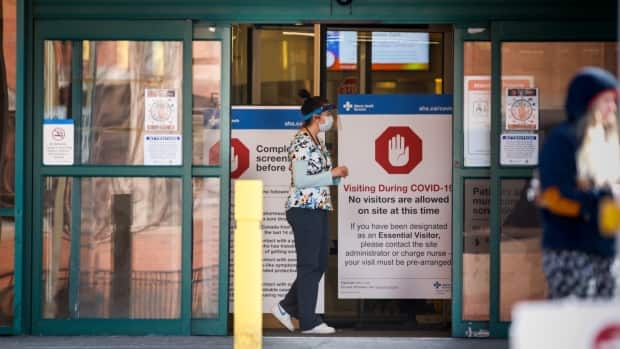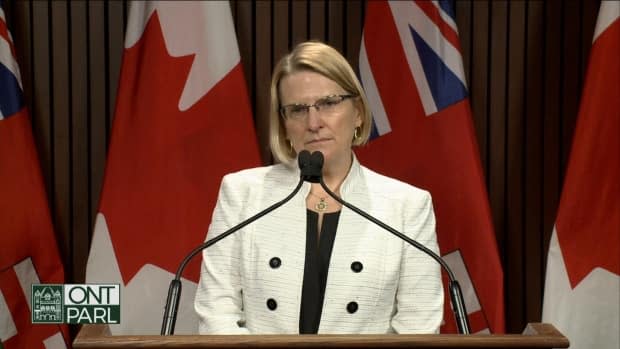Why Ontario medical experts are sounding the alarm over Alberta's move to scrap mandatory COVID-19 isolation

Ontario medical experts are sounding the alarm over Alberta's recent decision to significantly ease its COVID-19 restrictions, warning the move could cause ripple effects across the country — and the globe.
"The thing about this pandemic is that it's global and that means we are all interconnected," said Dr. Andrew Boozary, executive director of social medicine at the University Health Network.
"For policy makers to bury their heads away from the evidence and the science ... it is definitely concerning."
Despite a recent rise in infections in Alberta, Dr. Deena Hinshaw, the province's chief medical officer of health, announced a two-phased approach Wednesday to eliminate the few remaining public health orders in the province.
Starting Thursday, close contacts are no longer required to be notified of exposure by contact tracers nor will they be legally required to isolate, although it's still recommended.
Further measures will be eliminated Aug. 16. People who test positive for the virus will not be mandated to isolate at that time. Isolation hotels will also close as quarantine supports end.

Alberta will instead start altering its COVID-19 protocols to be more in line with those of the flu or other communicable diseases.
"With the vaccine readily available, the need for the types of extraordinary restrictions we used in the past has diminished," Hinshaw said.
But Boozary says there should be coordination between provinces to ensure "real disasters" don't happen across Canada.
"This will for sure have a ripple effect and for sure impact all of us," he said.
'We're just not there yet'
The change comes as Alberta is reporting some of its highest COVID-19 case counts the province has seen in weeks. The rate of infection has also continue to climb to points not seen throughout the pandemic.
The province says 54.7 per cent of Albertans are now fully vaccinated against COVID-19, while 64.3 per cent have now received at least one dose.

While infectious disease specialist Dr. Zain Chagla says the move is likely a preview of what other provinces will eventually adopt, he says the decision has come "prematurely."
"We're just not there yet," he said.
"There's still a quarter of that population where adults are still completely susceptible to the delta variant who aren't vaccinated."
Chagla highlighted several recent instances, including in Israel and the U.K., where the Delta variant has found its way to the unvaccinated population after restrictions were eased. In the U.S., Missouri and Florida are among the hardest hit by the summer surge in which the U.S. is now averaging more than 60,000 new cases a day.
"It's going to have stress on the health care system … it's certainly going to have effects on patient care," he said.
"If you take away the last tool to make sure health care utilization is not overwhelmed, you're going to see health care utilization overwhelmed."
Mounting criticism on social media
Other medical experts agree, taking to Twitter to criticize the move.
He says there is a compound of factors pointing against Alberta's recent move — including the fact that schools reopen in just over a month — and that it seems as though the province has fallen into the "false choice of public health versus the economy."
"The politicization is incredibly hazardous [and] really going to hamper us in this last mile," he said.
Boozary added that there needs to be more transparency on what thresholds — not just vaccination targets — are being considered before more restrictions are lifted.
Ontario to focus on keeping 'vast majority' safe
But the question remains: could Ontario follow in Alberta's path?
Asked at a news briefing Thursday whether Ontario would take a similar approach, Solicitor General Sylvia Jones didn't specifically answer either way, instead confirming only that the province's current indoor masking policy will remain in place for the time being.
"We are going to continue with the pathway that keeps the vast majority of Ontarian citizens safe and hope that people do the right thing and get vaccinated as soon as they can," she said.

The Ministry of Health said Thursday that more than 80 per cent Ontarians aged 12 and older have had at least one dose of a COVID-19 vaccine.
That means one of three conditions the province has set for moving beyond Step 3 of its reopening plan has now been met.
The province has said that if all of those conditions are satisfied, the majority of restrictions can be lifted as early as Aug. 6.
CBC Toronto has reached out to the Ministry of Health for comment on Alberta's recent move, and whether or not Ontario would consider a similar approach in the future, but hasn't yet received a reply.

